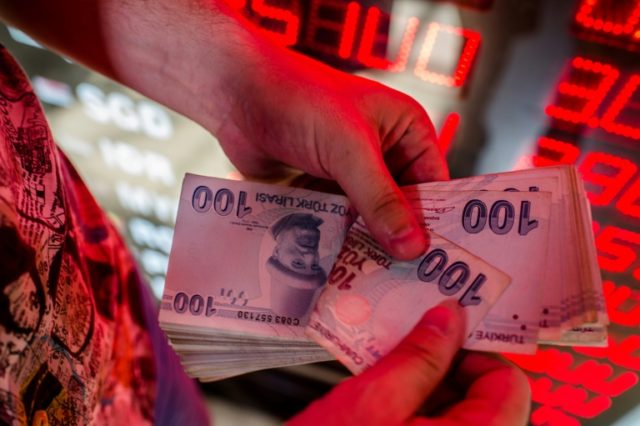Istanbul (AFP) – The embattled Turkish lira tumbled almost 20 percent to new record lows against the dollar on Friday as strains with the United States intensified, but President Recep Tayyip Erdogan defiantly proclaimed Turkey would emerge victorious in an “economic war”.
Compounding the lira’s agony, President Donald Trump said he had doubled steel and aluminium tariffs on Turkey, noting that relations between the NATO allies were “not very good”.
The lira’s plunge is one of the most serious economic crises that Erdogan has faced since coming to power in 2003 in the wake of a financial crisis in 2001 that brought the economy to near meltdown.
The currency turbulence coincides with the most bitter dispute with the United States since the 1974 Turkish invasion of Cyprus, which so far shows no sign of abating.
The lira was trading at 6.6 to the dollar at 1335 GMT, a loss on the day of 19 percent.
“The Turkish Lira is in a state of crisis, as a result of investor confidence in Turkish assets remaining at alarmingly low levels,” said Jameel Ahmad, Global Head of Currency Strategy & Market Research at FXTM.
– ‘National fight’ –
But Erdogan, who had remained unusually silent until now as the lira crisis mounted, urged Turks to take matters into their own hands.
“If you have dollars, euros or gold under your pillow, go to banks to exchange them for Turkish lira. It is a national fight,” he said.
“This will be the response to those who have declared an economic war,” he said, blaming Turkey’s woes on what he described as an “interest rate lobby” seeking to push the country to higher rates.
Erdogan had raised eyebrows Thursday when he appeared to invoke divine intervention, saying: “If they have dollars, we have our people, we have our right and we have Allah!”
Turkey remains at loggerheads with the United States over the detention for the last two years of American pastor Andrew Brunson and a host of other issues.
Trump intensified the alarm on financial markets with a new tweet on the Turkey row.
I have just authorized a doubling of Tariffs on Steel and Aluminum with respect to Turkey as their currency, the Turkish Lira, slides rapidly downward against our very strong Dollar!” Trump said on Twitter.
“Our relations with Turkey are not good at this time!”
But Erdogan said Turks should not be alarmed by exchange rate movements. “The dollar, the mollar, will not cut our path,” said Erdogan, adding Turkey had alternatives “from Iran, to Russia, to China and some European countries”.
– ‘May not stem worries’ –
Markets are deeply concerned over the direction of domestic economic policy under Erdogan with inflation at nearly 16 percent but the central bank reluctant to raise rates in response.
UBS chief economist for EMEA emerging markets Gyorgy Kovacs said a giant rate hike of 350-400 basis points would be “consistent with real rate levels that in the past helped to stabilise the currency”.
He warned that a “rate hike alone might not stem the worries about the US and Turkey tensions and a potential further escalation”.
And it remains unclear if the bank would be willing to sharply lift rates, with analysts saying the nominally independent institution is under the influence of Erdogan, who wants low rates to keep growth humming.
After winning a June election with revamped powers, Erdogan tightened his control over the central bank and appointed his son-in-law Berat Albayrak to head a newly-empowered finance ministry.
“President Erdogan’s strengthened powers under the new presidential system have made it increasingly uncertain whether policymakers will be able to act to stabilise the economy,” said William Jackson, chief emerging markets economist at Capital Economics in London.
– ‘Accelerating speed’ –
Concerns mounted Friday after a report in the Financial Times that the supervisory wing of the European Central Bank had over the last weeks began to look more closely at eurozone lenders’ exposure to Turkey.
The report said the situation is not yet seen as “critical” but Spain’s BBVA, Italy’s UniCredit and France’s BNP Paribas are regarded as particularly exposed.
With many Turkish companies have taken out loans in dollars, banks face a higher risk of default.
“Investors have been looking at the unfolding currency crisis in Turkey as a local difficulty, however the accelerating speed of the declines appears to be raising concerns about European banks exposure to the Turkish banking system,” said Michael Hewson, chief market analyst at CMC Markets UK.
Albayrak, who formerly served as energy minister, on Friday announced what he has described as a “new economic model” for Turkey but he focused on macro-economic issues and steered well clear of tackling the currency crisis.
The lira’s plunge has featured remarkably little on Turkish television channels and newspapers — most of which after recent ownership changes are loyal to the government — with media focusing instead on recent flooding by the Black Sea.

COMMENTS
Please let us know if you're having issues with commenting.